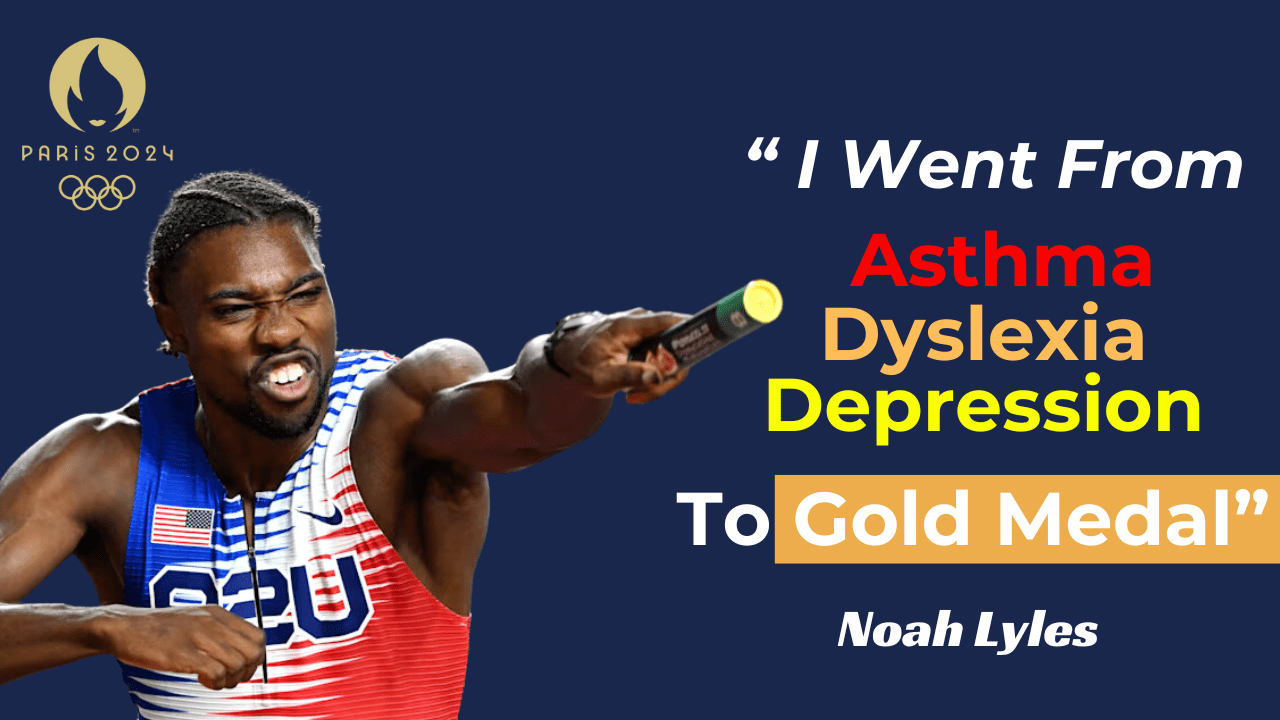Noah Lyles’ victory at the 2024 Olympics in the 100m sprint is not just a story of physical prowess but one of resilience, mental fortitude, and the power of a positive mindset. Lyles, now known as the fastest man in the world, overcame significant challenges that make his journey to gold all the more inspiring. This blog explores his incredible journey, the strategies he used to overcome adversity, and the lessons we can all learn from his story.
Early Life and Challenges
Born to Be a Champion
Noah Lyles was born on July 18, 1997, in Gainesville, Florida, into a family of athletes. His father, Kevin Lyles, was a gold medalist at the 1995 World Championships, and his mother, Keisha Caine Bishop, was a sprinter herself. From a young age, it was clear that Noah had inherited the athletic genes, but his journey was far from smooth.
Battling Health Conditions
From childhood, Lyles faced a series of health challenges that could have ended his dreams before they even began. He was diagnosed with several conditions, including allergies, dyslexia, anxiety, attention deficit disorder (ADD), depression, and asthma. For a sprinter, asthma alone could be a career-ending diagnosis, as it severely impacts breathing—an essential function for any athlete, especially in high-intensity sports like sprinting.
Despite these challenges, Lyles was determined to pursue his passion for running. His family supported him every step of the way, particularly his mother, who saw the fire in his eyes and encouraged him to train twice as hard as other athletes.
Overcoming Mental Health Struggles
The Impact of COVID-19
The COVID-19 pandemic brought new challenges for Lyles, exacerbating his struggles with anxiety and depression. The isolation and uncertainty of the pandemic took a toll on his mental health, leading to a disappointing performance at the Tokyo 2020 Olympics, where he secured a bronze medal in the 200m. This setback was a wake-up call for Lyles, who realized that he needed to focus on his mental well-being as much as his physical training.
Embracing Mental Health Strategies
After Tokyo, Lyles committed to therapy and began incorporating mental health practices into his routine. He adopted techniques such as visualization, mindfulness, and positive self-talk, which helped him shift his mindset from one of fear and doubt to one of curiosity and excitement. These strategies played a crucial role in his preparation for the 2024 Paris Olympics.
The Road to Olympic Gold
Strategic Preparation and Mental Focus
By the time the 2024 Olympics arrived, Lyles was not only physically prepared but also mentally stronger than ever. He faced fierce competition in the 100m sprint, but his mental training helped him stay calm under pressure. When doubts crept in after finishing third in the semifinals, he relied on deep breathing and relaxation techniques to regain his focus. His therapist’s advice to “let go, relax, and just be yourself” resonated with him as he stepped onto the track for the final race.
Victory and Reflection
In a dramatic finish, Lyles clinched the gold medal in the 100m final with a time of 9.79 seconds, cementing his status as the fastest man in the world. His victory was not just a testament to his physical abilities but also to the power of a positive mindset and perseverance.
Lessons from Noah Lyles’ Journey
1. Embrace Your Challenges
Lyles’ story teaches us that challenges, whether physical or mental, do not define us. Instead, it is our response to these challenges that shapes our future. By embracing his health conditions and working harder to overcome them, Lyles turned his weaknesses into strengths.
2. Focus on Mental Health
Mental health is just as important as physical health, especially for high-performing individuals. Lyles’ success highlights the importance of addressing mental health issues and incorporating practices like therapy, visualization, and mindfulness into our daily routines.
3. Develop a Winning Mindset
A positive mindset can make all the difference in achieving your goals. Lyles’ use of visualization and positive self-talk helped him stay focused and confident, even in the face of adversity. By believing in himself and his abilities, he was able to overcome doubts and achieve his dreams.
4. Persevere Through Setbacks
Setbacks are a natural part of any journey, but they do not have to define the outcome. Lyles’ disappointment in Tokyo fueled his determination to improve, leading to his ultimate triumph in Paris. His story reminds us that perseverance and resilience are key to overcoming obstacles and reaching our full potential.
The Finishing Line
Noah Lyles’ journey to Olympic gold is a powerful reminder that with the right mindset, support, and strategies, we can overcome even the most daunting challenges. His story is an inspiration to us all, demonstrating that our limitations do not define us—our perseverance and determination do. By applying the lessons from Lyles’ journey, we too can break through our own barriers and achieve greatness in our lives.
